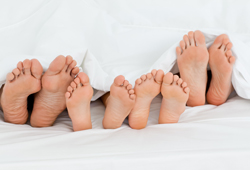HEALTH - HEALTHY & HAPPY
Prescriptions for Better Health
May, 2011 - Issue #79
 |
If it seems like your ears ring constantly, it's probably not your imagination. You may have tinnitus, an inner-ear ailment that affects between 25- to 50-million people. The symptoms of tinnitus influence basic life functions. Not only can hearing be affected but also the ability to sleep and to concentrate. It can also cause depression, anxiety and anger. An American Tinnitus Association survey found that eight out of 10 patients reported some tinnitus relief when using hearing aids. In some cases, alternative medicine has been effective in treating tinnitus. A number of herbs have been found to be useful in managing tinnitus. Ginkgo Biloba has been found useful in minimizing the distress of tinnitus by increasing blood flow to the brain. Another remedy used is castor oil, as well as zinc supplements. No one should ever ignore persistent tinnitus. In rare cases, tinnitus can be a symptom of a more serious health issue that could demand medical intervention. What's more, nearly everyone with tinnitus has hearing loss as well, which can result in an even more diminished quality of life. If you think you have tinnitus, have your hearing evaluated by an audiologist.
Audiology Associates 284-1900 www.audiologyassociates.net
Henry Mayo Newhall Memorial Hospital Offers Free CPR Class
HMNMH and Superior Life Support have joined forces to offer free monthly adult CPR classes. Approved by the American Heart Association, the Family & Friends CPR program is designed to educate participants on how to recognize and care for an adult or child who is choking and how to perform CPR. Classes are one hour long and open to anyone who wants to learn CPR but does not need to be certified. The free CPR class is held on the third Thursday of every month from 7 p.m. to 8 p.m. Space is limited and registration is required; Henry Mayo Newhall Memorial Hospital 253-8888 www.henrymayo.com
Are your Children's Feet Healthy?
Children with strong, healthy feet can avoid many kinds of lower extremity problems later in life. That's why it is important to inspect your children's feet periodically. Baby The size and shape of your baby's feet change quickly during their first year. Because a baby's feet are flexible, too much pressure or strain can affect the shape of their feet. It's important to allow your baby to kick and stretch their feet freely; make sure shoes and socks do not squeeze their toes. Toddler Do not force a toddler to walk before they are ready. Once walking begins, watch the toddler's gait. Many toddlers have a pigeon-toe gait, which is normal. Some initially learn to walk landing on their toes instead of on their heels. Most children outgrow both of these problems, but other conditions,, when detected early, can be treated more easily. To help with flat feet, special shoes or orthotics may be prescribed. To correct mild in-toeing or out-toeing, your toddler may need to sit in a different position while playing or watching TV. If your child's feet turn in or out a lot, corrective shoes, splints, or night braces may be prescribed.
The Footcare Center of Santa Clarita 253-3668
Don't Miss "Aging with Power"
Tune into KHTS 1220AM on Tuesdays at 11 a.m. for the informative "Aging with Power" program, hosted by Myles McNamara of Comfort Keepers; 287-4200
April 19: "Hospital Physical Therapy"
April 26: "The Pros and Cons of Electronic Health Records in Hospitals"
May 3: "Michael Dougherty from the Behavioral Health Unit at Henry Mayo"
|
||||||||||||||||||||||||||||





